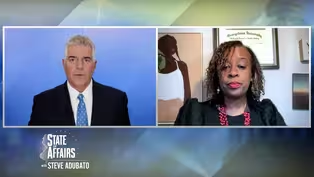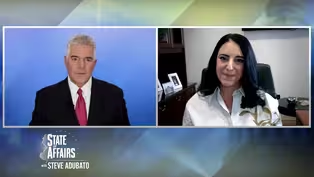State of Affairs with Steve Adubato
Diversifying and rebuilding trust in the NJ police force
Clip: Season 9 Episode 7 | 9m 41sVideo has Closed Captions
Diversifying and rebuilding trust in the NJ police force
Steve Adubato is joined by Wayne Blanchard, President of the NJ State Troopers Fraternal Association, to examine the organization’s efforts to support state troopers, promote diversity in the force, and rebuild community trust.
Problems playing video? | Closed Captioning Feedback
Problems playing video? | Closed Captioning Feedback
State of Affairs with Steve Adubato is a local public television program presented by NJ PBS
State of Affairs with Steve Adubato
Diversifying and rebuilding trust in the NJ police force
Clip: Season 9 Episode 7 | 9m 41sVideo has Closed Captions
Steve Adubato is joined by Wayne Blanchard, President of the NJ State Troopers Fraternal Association, to examine the organization’s efforts to support state troopers, promote diversity in the force, and rebuild community trust.
Problems playing video? | Closed Captioning Feedback
How to Watch State of Affairs with Steve Adubato
State of Affairs with Steve Adubato is available to stream on pbs.org and the free PBS App, available on iPhone, Apple TV, Android TV, Android smartphones, Amazon Fire TV, Amazon Fire Tablet, Roku, Samsung Smart TV, and Vizio.
Providing Support for PBS.org
Learn Moreabout PBS online sponsorship[INSPRATIONAL MUSIC STING] - Folks, we're now joined by Wayne Blanchard, who's the President of the State Troopers Fraternal Association.
Good to see you, Wayne.
- Steve, thanks for having me.
- You got it.
The website is up for the association.
You represent all the State Troopers, do you not?
- Yes, sir, all 1,900 of them.
- 1,900, and the role of the association is what?
- I mean, day-to-day collective bargaining, you know, grievances, legislation, where we're lobbying for a few bills.
Now, I was just down in Trenton yesterday, so, you know, very proud of what we do for our members and our record over the last eight years with my administration.
- Wayne, what's the most pressing, quote, "piece of legislation" in front of both Houses that matter most to our troopers?
- So we have a couple pieces of pension legislation.
So I testified on yesterday in Senate Budget.
One of them has to do with giving our troopers the availability to buy back some credit time from other endeavors, such as Class II special police, their academy service time.
And it's important because it gives us parity with our colleagues on the local county level.
And then there's a mechanism to buy military service academy time, which I think is a nice ditch for recruiting purposes.
And, and look, you know, as an organization, Colonel Schwarzkopf himself, our first superintendent, was a graduate of West Point, so, you know, I think it's a nice touch.
- Most people do not know that General Norman Schwarzkopf's dad was the first Head of the State Police.
Wayne, lemme ask you this, the Attorney General's report, you've commented on this before, the Attorney General's report says that there needs to be a massive overhaul of the state police, two independent reports on racial and gender discrimination saying that we are not where we need to be with respect to the State Trooper force as it relates to a more diversified workforce.
You say?
- So the first thing I'd say, again, I'm very proud of our record.
We've worked very hard with all the different groups of troopers that we represent, with other stakeholders in the community, and the legislature.
I think when you look at that report, I think it's 100 or 155 active, retired, and former troopers.
So I'm not so sure what former troopers means, but I have concerns with the validity of some of it.
When you talk about retired and former troopers, did they leave the organization with axes to grind and provide, you know, kind of suspect information?
- Well, I wanna be clear, you are confident that the level of diversity and gender and race in the State Police is what it needs to be?
- We're doing well.
Our position is we could always do better.
And again, we talk about efforts we've done with minority recruiting, things of that nature.
Now, where I have concerns is in that report, it was turned against us about how we treat pregnant females.
We treat them quite well.
We promulgated a policy in 2021.
It was the Attorney General's Office that actually unilaterally came in and took the policy away from our female troopers.
We've grieved that policy.
We've prevailed in the grievance forum, and it's also been recognized.
The legislature introduced a bill.
I testified on that, and it has cleared the full assembly, and we're waiting to move it in the Senate to give our female troopers their recovery leave rights.
- Wayne, help us understand this.
Obviously, the relationship between federal law enforcement, state, local, counties, complicated stuff.
Break this down in terms of those of us who are not in law enforcement can understand, our audience, in particular.
The ICE agency, the federal agency responsible for deportation of those who are here illegally, what is the role of the federal law enforcement officials versus, not versus, as it relates to the state?
Do state police have any role in that at all?
- So it's important to note that in 2019, the Attorney General's Office put out a directive.
That directive does not allow state, local, or county officers in New Jersey to participate in ICE operations.
Now, that's not withstanding certain task force and day-to-day enforcement of state laws.
In addition, the federal ICE officers are not allowed to utilize state or, you know, local police facilities, equipment, technology, databases, et cetera.
So look, as I said, troopers, we're professional.
We're proud to follow orders.
We're proud to have a role in the criminal justice system.
We respect everybody's dignity.
So we abide by that policy day in and day out.
Where I do have concerns, Steve, is that, you know, the lack there over the prohibition of communicating with our federal partners could present a safety issue for our troopers.
- Hold on, Wayne.
I need to understand.
We need to understand that.
Are you saying the current policy, the official policy in the state of New Jersey, is that you and your colleagues in the State Police cannot communicate with federal law enforcement agencies as it relates to immigration?
- Yes, Steve, you know, when you look at the policy, it's, you know, open-ended in both fashions.
So we're prohibited from, you know, collaborating with ICE or participating in their operations.
They're prohibited from coming to facilities, utilizing our equipment, our technology, our databases, so that, essentially, prohibits communication, which again, for me, it rises to concern of trooper safety.
Will it facilitate some type of, you know, tragedy down the road?
- Respectfully, then, Wayne, who's in charge?
- Well, I mean, when you, you look at this issue and that policy, I would say the Attorney General's Office is the one that promulgated that policy.
We follow it, and, you know, the federal government and the ICE agents have their own set of guidelines that they follow.
- You know, it's not my job to editorialize, but when law enforcement agencies are not in sync in coordinating implementation of policy, that can get tricky.
Is that a fair assessment, Wayne?
- That's exactly why I cited, I have, you know, trepidation about, you know, trooper safety, that a lack of communication could facilitate an issue down the road.
- What about safety for the general public as well?
- Agreed, agreed.
- Let let me ask you this.
You've been in law enforcement for how many years?
- 25 this year, Steve.
- Congratulations.
- Thank you.
- And thank you for your service.
- Thank you.
- To what degree, Wayne, are you concerned about the perception on the part of some that there's an anti-police view out there?
And again, defund the police, that issue seems to have gone away in the eyes of even those who are advocating it.
But here's my question.
Where do you think we are in terms of public opinion on law enforcement?
And I know it's a complex question.
- So look, there's still concern.
There's still an anti-police sentiment out there.
I agree with you, Steve.
I think it's getting better, but look, it's causing issues with, like, for instance, recruiting.
Our recruiting numbers are down.
And I think the anti-police sentiment plays a large part to blame for that.
You know, but what I would say is, you know, we've done a lot with all of our partners, community stakeholders, the legislature, you know, working to work on a number of pieces of legislation and other policy that I think are gonna be successful in getting confidence back in police.
You know, one of them I would name is police licensing.
But my point is we're only a couple of years into this, and I think like any policy, you have to allow the policy time to be implemented and work and then you reevaluate, you know, maybe a decade later, not two, three years later, and try to continue to make changes.
We need to see what we're doing, if what we did recently is working.
- Wayne Blanchard is the President of the State Troopers Fraternal Association.
Again, congratulations on the 25 years.
Thank you for your service.
We'll make sure we have you back.
Thank you, Wayne.
- Thank you, Steve.
- I'm Steve Adubato.
That's Wayne Blanchard, and we'll see you next time.
- [Narrator] State of Affairs with Steve Adubato is a production of the Caucus Educational Corporation.
Funding has been provided by EJI, Excellence in Medicine Awards.
New Jersey Children’s Foundation.
Delta Dental of New Jersey.
NJM Insurance Group.
United Airlines.
The Port Authority of New York and New Jersey.
PSE&G.
NJ Best, New Jersey’s five-two-nine college savings plan.
And by The Adler Aphasia Center.
Promotional support provided by New Jersey Monthly.
And by Meadowlands Media.
- At the New Jersey Children's Foundation, we believe all children should have access to a high quality public education regardless of where they live.
We believe schools should place students on paths to success, and we invest in schools and educators who are meeting those needs.
Whatever your seat on the bus: student, parent, teacher, business leader, you have a role in our mission.
In Newark, district and charter schools show great education is possible.
We're working to unite people across the city and state to provide students with the schools they deserve.
Improving urban education & learning outcomes in New Jersey
Video has Closed Captions
Clip: S9 Ep7 | 8m 46s | Improving urban education & learning outcomes in New Jersey (8m 46s)
Misconceptions about vaccines for preventable illnesses
Video has Closed Captions
Clip: S9 Ep7 | 9m 21s | Misconceptions about vaccines for preventable illnesses (9m 21s)
Providing Support for PBS.org
Learn Moreabout PBS online sponsorship
- News and Public Affairs

Top journalists deliver compelling original analysis of the hour's headlines.

- News and Public Affairs

FRONTLINE is investigative journalism that questions, explains and changes our world.












Support for PBS provided by:
State of Affairs with Steve Adubato is a local public television program presented by NJ PBS

